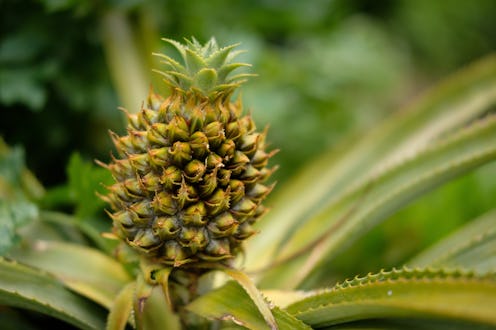Life
The Reason Why Your Mouth Gets Sore After Eating Pineapple Is Actually So Creepy

There's no better time to enjoy fresh fruit than during the summer months. While options like apples and pomegranates might go out of season, deliciously sweet fruits like mangoes, figs, strawberries, blueberries, watermelon, and pineapple are in their prime. There's something so summery about enjoying a piece of fresh pineapple on a warm day... unless you're one of the people who can't eat it without feeling your mouth and tongue grow kind of sore. No, it's not just you! If you've ever eaten some of this fruit then felt a strange feeling in your mouth, you aren't alone — and it's important to know what's going on rather than ignore it. There's a reason why your mouth hurts after eating pineapple, and it's actually kind of creepy.
Many people assume that the sore feeling in their mouth is because of an allergy to the pineapple itself, but that's not always necessarily true. In fact, according to Livestrong, pineapple allergies are not very common. Pineapple allergies typically cause side effects that include hives, shortness of breath, dizziness, stomach cramps, or swelling of the mouth, throat, and tongue. It can also lead to a strange sensation in your mouth, but it's usually coupled with the other symptoms mentioned. (If you feel any of that when eating the fruit, you should stop eating it right away and call a doctor.)
However, as Livestrong points out, the normal sore feeling many feel after eating pineapple is not an allergy, but is instead something in the actual pineapple that is messing with your mouth. Pineapple contains something called "bromelain." Bromelain is often used as a meat tenderizer because it breaks down proteins. If your mouth feels sore after eating pineapple, it could be because the bromelain is actually starting to break down proteins in your mouth. It's literally digesting the insides of your mouth. Definitely not a pleasant reaction to picture — or feel.
The reason you only feel this uncomfortable feeling in your mouth and not elsewhere in your body is because your stomach can break down bromelain. Your mouth can't, and the reaction can lead to a sore feeling, and even swelling.
If this is the only weird side effect you're feeling after eating pineapple, don't worry: you probably don't need to eliminate it from your diet completely. Heat inactivates bromelain so that it can't break down any proteins, meaning you can minimize the risk of this side effect by eating cooked or canned pineapple.
There's also a trick floating around on the internet that you can try: soaking peeled pineapple in salt water to reduce some of the irritation. The idea is that its the acidity of the pineapple that's bothering you, and soaking it in salt water helps dissolve some of that acidity, making the bromelain less effective. Of course, this isn't a scientific solution, and some say it doesn't work, but others swear by it.
Bromelain is actually a pretty interesting substance. It's most concentrated in the core (or the steam) of a pineapple. When it's isolated, it's used as a meat tenderizer, and it can even be used as a supplement for anti-inflammatory purposes.
If you can't imagine giving up pineapple and the sensation isn't that bad, then you'll probably be OK. Our bodies are pretty cool, and can fix the damage done by the enzyme. Your mouth will regenerate new skin and heal on its own pretty quickly, sometimes even in a few hours. So if you can stand the burning sensation for a little bit, you should be all good the next day.
But keep in mind that bromelain isn't totally harmless. It can interact with certain medications, like blood thinners, sedatives, anti-seizure medications, antidepressants, and insomnia medications. If consumed in large amounts, it can cause diarrhea, nausea, and vomiting. So, if the sore sensation is very intense for you, then yeah, you might want to stop eating pineapple altogether.
This article was originally published on June 27, 2018 and was updated on September 11, 2019.
This article was originally published on